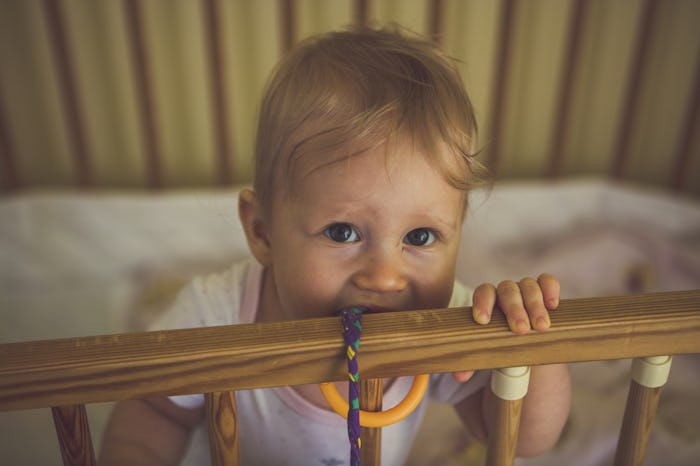Life

How Being A "Bad" Napper Affects Your Baby Later In Life
Sleep is one of the issues that divides, and unites, parents all over the world. Us parents can recognize the look of sleep deprivation in a fellow caregiver from a mile away and, sadly, argue about sleep training and/or co-sleeping tactics. Most of us aren't sleep experts, though, which means our general cluelessness binds us together. For example, I would bet a co-sleeping and a sleep training mom both wonder how being a "bad" napper affects your baby later in life. In the end, and regardless of how we choose to "help" our babies get the sleep they need, all of us parents worry about how sleep, or lack thereof, is impacting our babies and their futures.
Exactly what constitutes a "bad" napper differs depending on who you ask and/or speak with. Some napping habits may be considered less than ideal, but if they don't bother the parents of the baby in question it isn't really a problem. For example, some babies need the warmth of their parent's body to fall asleep, which according to Parents is a "sleep crutch" — like nursing, walking, swinging, singing, or rubbing your baby's back — that a baby can come to rely on in order to go to sleep.
So it's worth remembering that any sleep association, habit, or sleep crutch — like a baby only being able to fall asleep if they're in motion, or napping without a schedule — are really only "bad" if they're causing you, the parent,discomfort, inconvenience, stress, or keeping your baby from getting the recommended amount of sleep they need per their age and developmental stage.
If you're able to manage your baby's seemingly erratic sleeping patterns, there isn't really any reason to try to change their habits. The Baby Sleep Site reminds parents that it's natural for babies to wake regularly, especially when they're learning how to sleep.
The exception, of course, is when it comes to safety. The American Academy of Pediatricians (AAP) "Back to Sleep" campaign continues to remind parents that the best sleep space for a baby is in their own crib without loose bedding, pillows, toys, stuffed animals, or blankets, and to always lay your baby down on their back. The AAP goes on to say that if your baby falls asleep in another environment other than what is recommended, you should transfer them to a safer sleep space as soon as possible:
"If your baby falls asleep in a car seat, stroller, swing, infant carrier, or sling, you should move him or her to a firm sleep surface on his or her back as soon as possible."
If your baby exhibits any of the traditional "bad" napping habits — such as only napping on the go, getting day and night time mixed up, only sleeping on you, or sleeping for short periods of time — it's normal to start worrying about any potential, long-term implications. So, will these habits affect them later in life?
There are reported effects on older children when they do not have consistent bedtimes. Researchers writing in the Journal of Epidemiology and Community Health in 2013 found that good sleep routines do matter. The research went on to say scientists found there was a decrease in cognitive function in those school-aged children with erratic sleeping habits, writing:
"The consistent nature of bedtimes during early childhood is related to cognitive performance. Given the importance of early child development, there may be knock on effects for health throughout life."
As babies are still developing their ability to sleep soundly, however, parents shouldn't be too alarmed if their baby doesn't nap well. Setting schedules, trying to encourage your baby back to sleep when they wake prematurely, and providing a good environment for sleep are all great steps towards enjoying those sweet, sweet dreams.